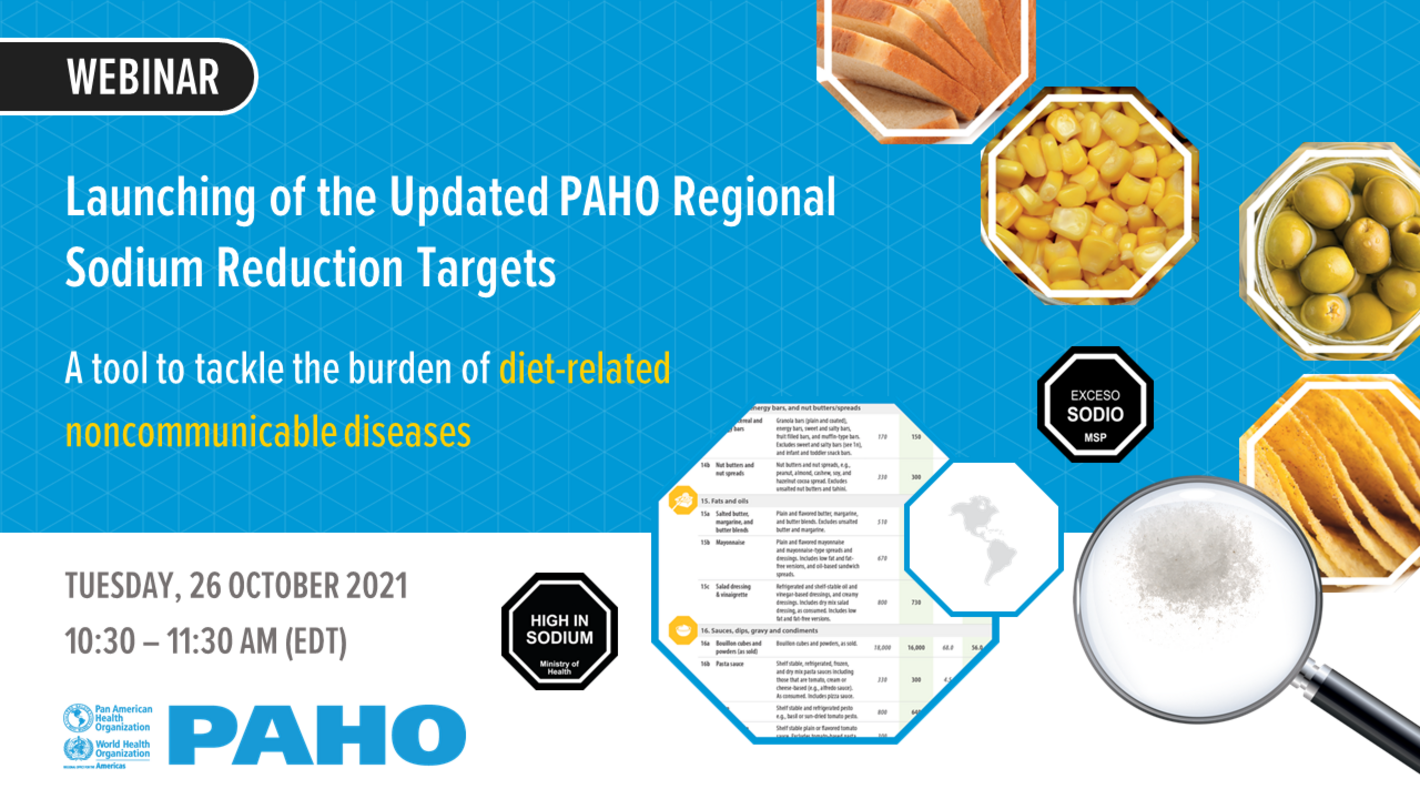
Join us for the launch of the publication “Launching of the Updated PAHO Regional Sodium Reduction Targets” on Tuesday, 26 October 2021, from 10:30 to 11:30 am (EDT).
Background
In the Region of the Americas, noncommunicable diseases are responsible for more than 80% of all deaths, with cardiovascular diseases (CVDs) being the leading cause of death in almost all countries. Over half of CVD deaths in the Region are attributable to high blood pressure. There is clear evidence that excessive consumption of salt/sodium adversely affects blood pressure. The World Health Organization (WHO) recommends a population-based daily intake of less than 5 g of salt (< 2 g of sodium) per adult from all sources as the target for dietary salt/sodium reduction initiatives. However, salt/sodium consumption in the Region is well above the recommended level, with daily salt intake ranging from 8.5 g to 15 g per person.
It is crucial to advocate for and promote policies to prevent noncommunicable diseases and reduce salt consumption. Reformulation of foodstuffs to contain less salt and setting salt content targets in food and meals is one of the four strategies identified by WHO to reduce salt/sodium in the population.
For this reason, PAHO in collaboration with the University of Toronto and the TAG (Technical Advisory Group) on Cardiovascular Disease Prevention through Population-wide Dietary Salt Reduction has developed updated sodium reduction targets for the reduction of sodium content in processed and ultra-processed, building on the first set of regional targets developed in 2015 and in line with the WHO Global Benchmarks. These targets are an important tool to help countries setting national sodium reduction targets and will be launched in a webinar.
Audience
The primary audience will be ministries, other governmental entities and decision-makers, researchers, health professionals and civil society organizations.
Objectives:
1. Launch the Updated PAHO Regional Sodium Reduction Targets including how they were developed
2. Present the methodology behind the development of the new targets.
3. Discuss the future steps regarding the targets’ implementation
How to participate
- DATE: Tuesday, 26 October 2021
- TIME: 10:30 - 11:30 am (EDT) [see time correspondence below]
- REGISTER: https://paho-org.zoom.us/webinar/register/WN_OTI-MCNPS8iz6pEdse9WVQ
- After registering, you will receive a confirmation email with information on how to join the webinar.
The session will be available in English, Spanish, and Portuguese with simultaneous translation.
Recording
Agenda
- 10:30 AM – 10:45 AM - Opening and Welcome
- Anselm Hennis – Director of the Department of Noncommunicable Diseases and Mental Health, Pan American Health Organization (PAHO)
- Chizuru Nishida – Coordinator, Nutrition Policy and Scientific Advice Unit (WHO)
- Tom Frieden – President, Resolve to Save Lives (RTSL)
- 10:45 AM - 10:55 AM - Presentation of the Updated PAHO Regional Sodium Reduction Targets in the Americas
- Fabio da Silva Gomes –– Advisor on Food and Nutrition (PAHO)
- 10:55 AM – 11:10 AM - Methodological approach and support data for the development of the updated targets
- Mary L’Abbe – Professor, Department of Nutritional Sciences, and Director, WHO Collaborating Centre in Nutrition Policy for Chronic Disease Prevention. Faculty of Medicine, University of Toronto;
- 11:10 AM– 11:20 AM - Importance of the New Targets for Country Implementation
- Brazil – Dr. Eduardo Nilsson, Asesor Técnico, Coordinación General de Alimentos y Nutrición, Ministerio de Salud
- Argentina – TBD
- 11:20 AM – 11:25 AM - Q & A
- 11:25 AM -11.30 AM - Final comments and closing
Correspondencia horaria
- 7:30 am. Los Angeles
- 8:30 am. – Belmopan, Guatemala City, Managua, San José (CR), San Salvador, Tegucigalpa
- 9:30 am – Bogota, Kingston, Mexico City, Panama City
- 10:30 am. – Bridgetown, Castries, Georgetown, Nassau, Port-au-Prince, Port of Spain, San Juan, Washington DC
- 11:30 am. – Asunción, Brasilia, Buenos Aires, Montevideo, Paramaribo, Santiago
- 4:00 pm. – Geneva, Madrid
For other cities, check the time in the following link
